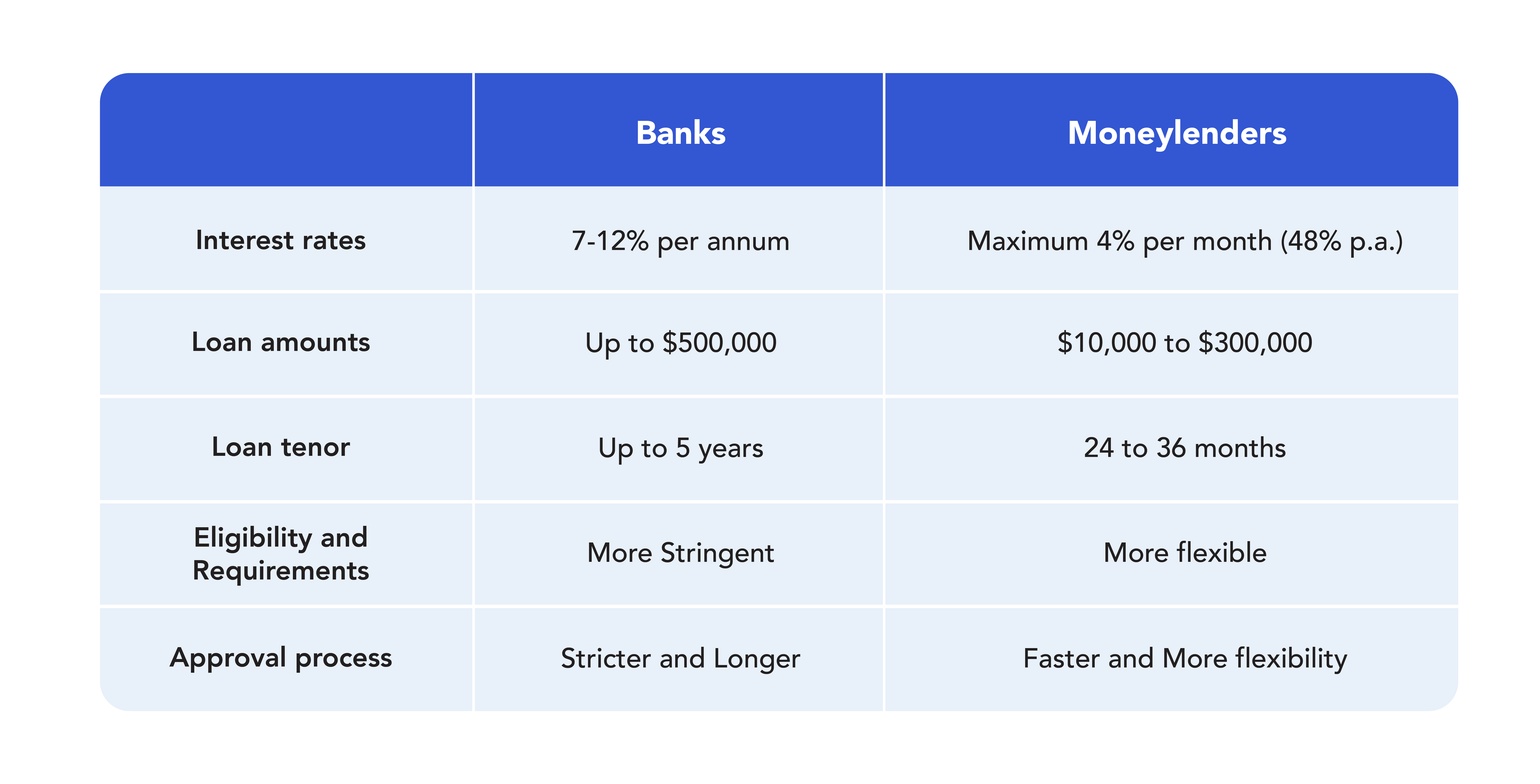
The two most common sources of SME business loans in Singapore are banks and moneylenders. Each, for reasons that range between size, scope and financial wherewithal, differ in the type of interest rates they offer, loan process, eligibility requirements, tenor or quantum. This can make it hard to determine which to approach for a business loan. In this article, we’ll compare banks vs moneylenders in SME business financing.

Banks charge interest rates on an annual basis, and we commonly see a range of about 7.5 to 12.0% per annum. Certain SME loan products might charge slightly higher interest rates, up to about 15% p.a. but that is not too common.
Moneylenders on the other hand, charge a higher interest rate range on average. The monthly interest rates among money lenders can range from 1.0 to 4.0% per month, sometimes even lower, so this works out to about 36% to 48% per annum. The Ministry of Law caps interest rates of moneylenders at 4% per month, so your maximum interest rate will not exceed 48% p.a.
The loan interest rate you ultimately receive from banks and moneylenders depends very much on your company’s credit records, including any existing loans, your current business incomes, your repayments records and more.
The loan amount you can expect from banks will be higher than those offered by private moneylenders. While moneylenders usually offer a financing range of between $10,000 to $300,000, some banks offer financing of up to $500,000.
If you need a higher amount for your SME business, approaching a bank would be the better option. Private moneylenders tend to be much smaller establishments than banks, and therefore they usually do not have the risk capacity or the resources to offer higher loan quantums. In some cases, you will also see certain banks offering higher SME financing above the usual $500,000 mark, but that is usually offered to borrowers with excellent creditworthiness.
As banks offer higher loan quantums, they also offer longer tenors to make repayments. You can expect to have SME loans from banks with tenors lasting up to 5 years, but more commonly about 3 years. Moneylenders typically offer repayment tenors lasting about 12 to 36 months, which is about 1 to 3 years. Generally, you’ll find that moneylenders offer an average of about 24 months for business loans on the higher end.
Keep in mind that your business loan tenor is influenced by the loan amount, as well as whether you can afford the monthly repayments. Most lenders, whether banks or moneylenders, will be open to negotiating your loan tenor based on your repayment capacity. In favourable circumstances, such as a consistent high revenue, strong company performance or a good credit history, your loan tenor may be extended to offer more manageable monthly installments.
When it comes to the basic eligibility conditions and documentation requirements for SME business loans, both banks and moneylenders usually share the same set of requirements. In general, these are what most lenders will state about companies:
While both banks and Moneylenders state the same requirements, they differ significantly on how strictly they require a borrower to meet these requirements. In general, banks are more stringent in requiring applicants to follow the basic eligibility conditions and submit the required documents. Moneylenders on the other hand, are more willing to be flexible with these conditions.
In general, banks have a more demanding approval process, requiring borrowers to fulfill a strict set of requirements, especially in terms of creditworthiness. They also tend to take longer to process your SME business loan as they often have a more complex organisational structure which may need several levels of reviews and approvals.
Money lenders have a more flexible approach, and are often willing to lend to those who don’t meet the bank’s requirements for credit history, income and the like. They also tend to process applications faster as they are smaller financial organisations without as many levels of approvals as banks.
Both banks and money lenders offer convenient processes these days, where you can start your application online. Most of them allow you to apply with your Singpass business myinfo, making it even more convenient as your required documents are usually found there already.
The only significant difference between the two is that moneylenders are required by the Ministry of Law to meet you at their registered business premise before the loan contract can be signed and the loan disbursed. This is so that the lenders can verify your identity, and vice versa.
While banks offer more competitive rates and higher quantums of financing, money lenders are more flexible when it comes to eligibility and creditworthiness, often accepting applications that would otherwise be turned down by banks.
Both banks and private moneylenders have their own benefits. The best choice comes down to your unique needs. We recommend banks for established SMEs with strong credit profiles and the ability to meet stricter documentation and eligibility requirements. On the other hand, moneylenders may be more suitable for newer businesses or those with less-than-perfect credit histories.
Lendingpot is the perfect springboard to help you secure a loan that aligns with your business goals and financial needs. With over 45 lending partners consisting of banks, private lenders, venture capitalists, P2P lenders and more, you’ll have access to a wide variety of SME financing products.
Signing up with us is quick and easy, all you need is your Singpass business myinfo. Should you have any further questions about SME loans, don’t hesitate to chat with us today.

Lina heads up all things marketing and branding at Lendingpot. With a keen aesthetic eye, she believes in the use of design to communicate with our SME community and aspires to turn Lendingpot into a household name. Out of work, she is an avid camper and appreciator of nature’s best works.